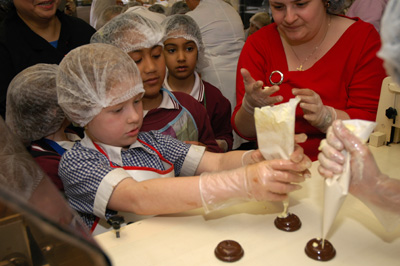Junior Chefs take over the Kitchen

Junior Chefs take over the Kitchen
This September, cooking classes are all about the kids at William Angliss Institute as the Kids in the Kitchen short course program gets into full swing.While excitement stirs (pardon the pun) around kids in the kitchen, a whole calendar of cooking short courses enables the chefs of tomorrow to ignite their passion for food in the same kitchens where great chefs such as Karen Martini and Shannon Bennett started their careers.
What's on these holidays:
Cooking for Teens: 28th-30th of September, $375
Chef for a Day: 23rd of September, $135
Little Chocolatiers: 21st of September, $125
Kids Baking: 29th of September, $125
Zoo Bread: 30th of September, $125
Little Cookie Cutters: 28th of September, $125
Make a Macaron Tower: 22nd of September, $125
Kids In The Kitchen
William Angliss Institute, 555 La Trobe Street, Melbourne VIC
Phone 03 9606 2111 or visit www.shortcourses.angliss.edu.au
In response to demand, William Angliss Institute is also preparing to launch its Young Chef and Junior Chef courses which offer more in-depth training in 13 classes over 9 weeks, starting January 11, 2011.
Interview with Pauline Dine
Pauline Dine is the Manager of Short Courses at William Angliss Institute.Question What hopes do you have for children participating in these classes?
Pauline Dine: I would be happy if they learn to enjoy food, more so, than perhaps people who don't learn to cook. When you cook you lead a healthier and more vibrant life understanding and valuing the food that you're eating.
I hope that our participants learn how to optimise their food, for their health by learning to cook it properly. It is also great for them to learn what is sustainable and what makes food enjoyable. Children often shy away from food or grow up with very picky habits because they don't fully understand food and properly eat food, which is not to their liking. We will pitch to them about food and how to enjoy food, we will make things that they like and we will encourage them to taste things, so that they then learn to identify what they like. Hopefully they will be healthier and happier.
Question Do you think it is important to encourage children to participate in cooking classes, ultimately for when they leave home?
Pauline Dine: Oh yes! Cooking is a life skill; it's not always towards a career. Not every person that studies to be a chef turns out to be a chef, in the industry. The skills that they will learn will take them through the rest of their lives and that, in itself, leads to a better, more fulfilled life.
Question There are a lot more young children entering kitchens, Australia wide, why do you think this is?
Pauline Dine: I think it is part of a change in lifestyle, a change of attitudes towards children because in the past they were to be 'seen and not heard', now it is more about encouraging them to be apart of life and help drive their life journey towards the way that they like it. It's not often, until you're an adult, that you see all the mistakes that you made (laughing) and where things could be better.
We feel that by bringing kids on the journey, with us and teaching them about cooking, much earlier in life that they may have a greater appreciation and be able to look after our planet, better for the future.
Question What does the Kids in the Kitchen program involve?
Pauline Dine: It involves:
giving kids a greater understanding of our food,
the value of food,
the sustainability of food,
what is healthy food,
what is whole food,
what is organic food;
and then how to use that food.
Also, how to get good value out of food, in cooking,
what are the basic recipes, for good, successful cooking;
and to give a fundamental understanding of food, cooking and enjoyment of food.
Question Can you talk a little bit about the Young Chef and Junior Chef courses?
Pauline Dine: The Junior Chef will be give participants
the fundamental understanding of what food is,
what is real food,
and provide an understanding as to what is different about off-the-shelf-food.
They will also learn about fundamental equipment in a kitchen and how best to use it,
as well as what are the skills required to cook, for example, knife skills.
Also, how to be safe and hygienic around food.
Participants will also learn the basics of going through the various methods of cookery and learning starter fundamental skills for cooking in those methods.
The difference with Young Chef is they will actually get more into the cooking and they will be more challenged by food tastes, food recipes and being able to identify a deeper appreciation of food.
Question Do you think Junior MasterChef will encourage young children to participate in cooking classes?
Pauline Dine: It is exciting to see that kids have a level of knowledge, in terms of food, already. However I feel that unfortunately kids haven't been given the grounding of the basic understanding of food in terms of how to value and manage food. Most people could be given a recipe and ingredients and be able to cook it, if the recipe is fairly basic. What we want to teach is the fundamental understanding of how you make a good stock, what are the key factors about working with fish, that you should know about and what makes a good meat dish. We hope to give children the basic tools so that when they go home they know that fish doesn't take too long. Or, know that they always need to start with a good stock.
When they have all those basic skills then they can move onto really working with those skills, in a recipe. Our job is to start them on the journey and then if they wish to be a chef, at the end of the journey they can. However, if they just want to use the program for their life skills, then it's a wonderful start.
In terms of Junior MasterChef, I had a mother contact me about the classes and she mentioned that her daughter had been in the 'cook-off' for Junior MasterChef and she wasn't selected and this has helped her realise that she needs to come and do a class, to start with. The classes will provide her with confidence and further her basic knowledge. I feel that these classes will help kids who want to aspire to cooking like they do on the television or to move up to a chef career, in the future.
Question Have you run cooking classes like this in the past?
Pauline Dine: Not to this extent. We have be running Kids Cooking Classes now, for a couple of years, but they have been mainly one-day classes. However, last holidays we started running Chef For A Day, so kids could come into the kitchen and feel what it's like to be a chef, for the day. The Chef For A Day classes have been highly popular, each year. Last holidays we ran Cooking For Teens, a three day class which was filled, after that we thought we were ready to run a longer program.
The Junior Chef and Young Chef will be approximately 40+ hours, run over three months, with a graduation lunch. The graduation lunch is where the graduates cook their lunch, for their parents and friends and also receive a certificate.
MORE





